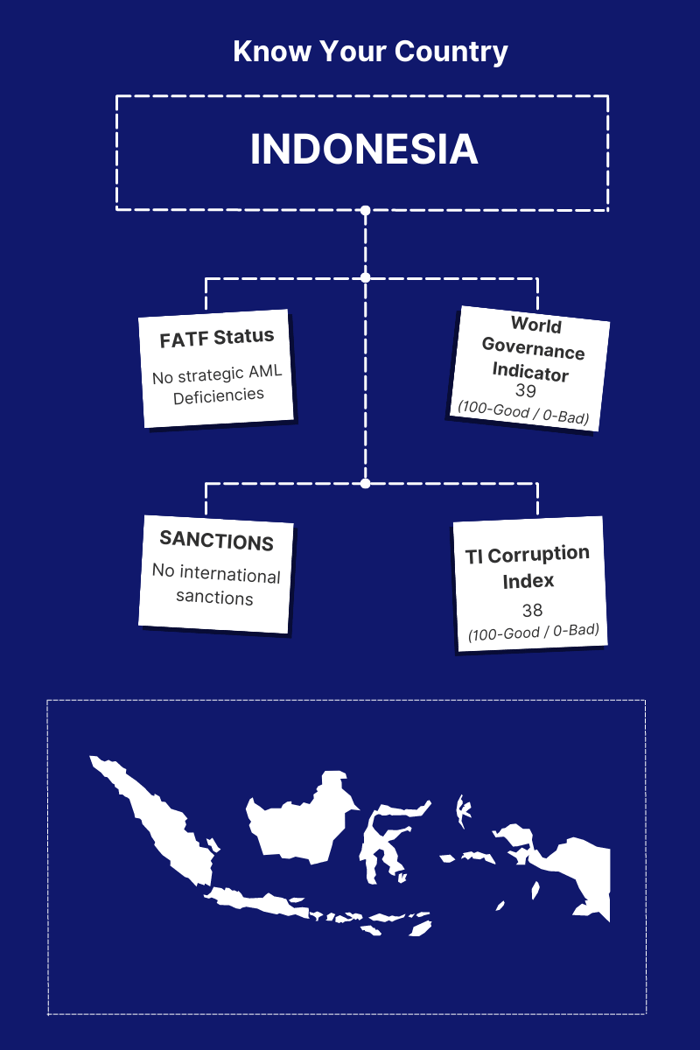Indonesia’s Fintech Industry: AML Challenges and Technology Solutions
Indonesia's fintech industry has experienced significant growth in recent years, driven by the country's large unbanked population and rapid digitalization. This growth brings with it the need for strong anti-money laundering (AML) compliance measures to ensure the integrity of the financial system and protect against illicit activities.
AML compliance is crucial in the fintech sector to mitigate the risk of money laundering, terrorist financing, and other financial crimes. The unique characteristics of fintech, such as digital transactions and remote customer onboarding, require tailored AML strategies and solutions.
Indonesian fintech companies face several challenges when it comes to implementing effective AML strategies. These include navigating complex regulatory requirements, managing the increased volume of digital transactions, and ensuring robust customer due diligence processes while maintaining a seamless user experience. Overcoming these challenges is essential to foster trust, safeguard the industry, and comply with regulatory obligations.
AML Landscape in Indonesia
The Regulatory Framework for AML in Indonesia
Indonesia has established a comprehensive regulatory framework for AML, which includes laws, regulations, and guidelines to combat money laundering and terrorist financing. Key regulatory bodies such as Bank Indonesia and the Financial Services Authority (OJK) play a crucial role in overseeing AML compliance in the country.
Overview of the Key AML Regulations and Requirements
Fintech companies in Indonesia are subject to specific AML regulations and requirements. These include conducting customer due diligence (CDD) procedures, implementing transaction monitoring systems, reporting suspicious transactions, and maintaining records of customer information. Compliance with these regulations is essential to ensure transparency, traceability, and accountability in the fintech industry.

AML Challenges in the Indonesian Fintech Industry
The Indonesian fintech industry faces unique AML challenges. Rapid customer onboarding and digital transactions pose risks in terms of verifying customer identities and detecting potential money laundering activities. Additionally, the evolving nature of fintech services and the use of emerging technologies require continuous adaptation of AML strategies to keep pace with evolving threats. Overcoming these challenges requires innovative approaches and technology solutions tailored to the specific needs of the fintech sector.
- Digital Transaction Risks: Fintech companies in Indonesia face challenges related to the risks associated with digital transactions. The fast-paced nature of fintech services and the increasing adoption of digital payment platforms create opportunities for money laundering activities. Implementing robust AML measures, such as transaction monitoring and identity verification, is crucial to mitigate these risks.
- Robust AML Measures: The Indonesian fintech industry needs to establish robust AML measures to detect and prevent money laundering. This includes implementing advanced transaction monitoring systems that can identify suspicious activities, such as unusual transaction patterns or high-risk transactions. Additionally, having effective risk assessment frameworks and internal controls is essential to ensure compliance with AML regulations.
- Customer Due Diligence and KYC Requirements: Fintech platforms in Indonesia must comply with stringent customer due diligence (CDD) and Know Your Customer (KYC) requirements. Conducting thorough identity verification, verifying the source of funds, and monitoring customer transactions are crucial steps in complying with AML regulations. Fintech companies need to implement streamlined and efficient KYC processes to onboard customers while ensuring compliance with AML obligations.
Technology Solutions for AML Compliance in the Indonesian Fintech Industry
- Technology-Driven AML Solutions: Fintech companies in Indonesia can leverage advanced technology solutions specifically designed for AML compliance. These solutions include robust transaction monitoring systems, AI-powered risk assessment tools, and automated compliance workflows. Implementing such technology-driven solutions can significantly enhance the effectiveness and efficiency of AML compliance processes.
- Enhancing AML Capabilities with AI and Machine Learning: Artificial intelligence and machine learning technologies play a vital role in strengthening AML capabilities. These technologies can analyze large volumes of data, identify patterns, and detect suspicious activities more accurately and efficiently. By leveraging AI and machine learning algorithms, fintech companies can proactively detect and mitigate potential money laundering risks.
- Benefits and Challenges of Technology Adoption: Adopting technology solutions for AML compliance in the fintech sector offers numerous benefits. It enables real-time monitoring of transactions, reduces false positives, improves detection accuracy, and enhances operational efficiency. However, there are challenges to consider, such as the initial implementation cost, integration with existing systems, and ensuring data privacy and security. Overcoming these challenges through careful planning and collaboration with technology providers can yield significant long-term benefits for fintech companies in meeting their AML compliance obligations.
Future Outlook: Enhancing AML Compliance in the Indonesian Fintech Industry
- Emerging Trends in AML Technology: The future of AML compliance in the Indonesian fintech industry is shaped by emerging trends and advancements in technology. These include the integration of blockchain for secure and transparent transactions, the use of big data analytics to identify money laundering patterns, and the application of predictive analytics for proactive risk management. Fintech companies should stay informed about these trends and leverage them to enhance their AML compliance strategies.
- Recommendations for Stronger AML Compliance: To strengthen AML compliance efforts, fintech companies should prioritize the adoption of advanced technology solutions. Implementing robust transaction monitoring systems, enhancing customer due diligence processes with AI-based identity verification tools, and investing in employee training on AML best practices are crucial steps. Additionally, fostering collaboration with regulatory bodies, sharing industry insights, and staying up to date with regulatory changes are essential for maintaining effective AML compliance.
- Importance of Continuous Monitoring and Collaboration: AML compliance in the fintech industry is an ongoing process that requires continuous monitoring and collaboration. Fintech companies should regularly assess their AML systems and procedures, leveraging technology to adapt to evolving risks and regulatory requirements. Collaboration within the industry and with regulatory authorities promotes knowledge sharing, fosters innovation, and strengthens the collective efforts in combating money laundering. By embracing a proactive and collaborative approach, the Indonesian fintech industry can stay ahead in the fight against financial crimes.
By embracing technology solutions, staying proactive, and fostering collaboration, the Indonesian fintech industry can effectively address AML challenges and ensure compliance with regulatory requirements, thus promoting a safer and more secure financial ecosystem.
Final Thoughts
The Indonesian fintech industry faces unique challenges in implementing effective AML strategies due to the nature of digital transactions, customer onboarding processes, and evolving regulatory requirements. These challenges require innovative solutions to ensure compliance and mitigate the risk of financial crimes.
Technology solutions play a crucial role in overcoming AML challenges in the fintech industry. Advanced technologies such as artificial intelligence, machine learning, and big data analytics enable fintech companies to enhance their AML capabilities, automate transaction monitoring, and improve due diligence processes. By leveraging technology, fintech companies can strengthen their AML compliance efforts and build trust among customers and regulatory authorities.
AML compliance should be a top priority for fintech companies operating in Indonesia. It is essential for them to understand the unique AML challenges they face and explore technology-driven solutions to address these challenges effectively. Companies should consider partnering with reputable technology providers like Tookitaki to implement robust AML systems and ensure a secure and compliant fintech ecosystem. By embracing technology and staying proactive in their AML compliance efforts, fintech companies can safeguard their operations, protect their customers, and contribute to the financial system's integrity.
Anti-Financial Crime Compliance with Tookitaki?



